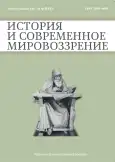The Volga-Don Canal: Historiography of River Connections and Engineering Thought of the XIX-XX Centuries
- Авторлар: Yurkin I.N.1
-
Мекемелер:
- Russian Academy of Sciences. S.I. Vavilov Institute for the History of Science and Technology
- Шығарылым: Том 4, № 3 (2022)
- Беттер: 98-102
- Бөлім: Articles
- URL: https://bakhtiniada.ru/2658-4654/article/view/147255
- DOI: https://doi.org/10.33693/2658-4654-2022-4-3-98-102
- ID: 147255
Дәйексөз келтіру
Толық мәтін
Аннотация
Негізгі сөздер
Толық мәтін
##article.viewOnOriginalSite##Авторлар туралы
Igor Yurkin
Russian Academy of Sciences. S.I. Vavilov Institute for the History of Science and Technology
Email: ig-yurkin@yandex.ru
Dr. Sci. (Hist.), Chief Scientific Officer Moscow, Russian Federation
Әдебиет тізімі
- Bernstein-Kogan S.V. Volga-Don: Historical and geographical essay. M., 1954. 223 p.
- Ivlev D.M. Peter the Great's European Project: The Vyshnevolotsk Water System. The role of English, Dutch, Italian and French craftsmen in the initial stage of the construction of the Vyshnevolotsk water system. Vyshny Volochek; Veliky Novgorod: type. Viscount, 2022. 160 p.
- Istomina E.G. Waterways of Russia in the second half of the XVIII - early XIX century. M., 1982. 277 p.
- Kleitman A.L. Materials of the scientific expedition of G.M. Lovitz and P.B. Inokhodtsev of 1769-1774 as sources on the history of the Lower Volga region // Izvestiya Saratov State University 2011. Vol. 11. Ser. History. International Relations. Issue 1. pp. 3-8.
- Legun A.I. Voronezh-Rostov Waterway: (To the question of the 11th lesson program of the 5th order. sessions Voronezh. district. com. 15-18 Sep. 1909). Voronezh, 1909. 98 p.
- Levshin V.A. Topographic description of Tula province. 1803. Tula: Peresvet, 2006. 392 p.
- Milovidov A.I. Ivanovsky Canal, begun by Peter the Great to connect the Volga with the Don (Historical and geographical essay) // Readings in the Society of History and Antiquities of Russia. 1892. Book 1 (160). pp. 1-30.
- Platonov A.P. Epiphany sluices / Comp., afterword., comm. I.N. Yurkina. Tula, 2018. 68 p.
- Puzyrevsky N.P. Water connection of the Volga and Don rivers: Ist., ekon. and tech. the lights, the surveys of 1910 and the project will connect. the channel at the place of the greatest convergence of the names. Materials for describing Russian rivers and the history of improving their navigable conditions. Issue 35. St. Petersburg, 1912. 28, 394 p.
- Tikhvin water system: retrospective and modernity. Hydrological and ecological situation and landscape changes in the waterway area / Shiroko V.A., Snytko V.A., Nizovtsev V.A. and others. M., 2013. 342 p.
- Ulanov K.A. Transport river communications of metallurgical state-owned plants of the Urals with the European part of Russia in the 20-50s of the XVIII century. Diss... Candidate of Historical Sciences. Yekaterinburg, 2021. 286 p.
- Yurkin I.N. 200-kilometer monument to Peter (Ivanovo Canal): problems of studying and preserving its structures // Peter's Monuments of Russia and Europe: study, preservation, cultural tourism: materials of the VII International. Petrovsky Congress (St. Petersburg, June 5-7, 2015). St. Petersburg, 2016. pp. 424-433.
- Yurkin I.N. The water tract of Kulikov field. Pages of the history of the Ivanovo canal. Tula, 2020. 181 p.,
- Yurkin I.N. Ivanovsky Canal: new (2013-2020) studies of a unique monument of the history of Russian hydraulic engineering // Institute of the History of Natural Science and Technology named after S.I. Vavilov. Annual Scientific Conference, 2021. Moscow, 2021. pp. 64-72.
- Shtuckenberg J.Ch. Beschreibung aller, im Russischen Reiche gegrabenen oder projectirten, schiff- und flossbaren Canaele, in historischstatistisch-technischer Beziehung, nach den vollstaendigsten und zuverlaessigsten Quellen verfasst… SPb., 1841. V, 572, 2 p.
Қосымша файлдар








